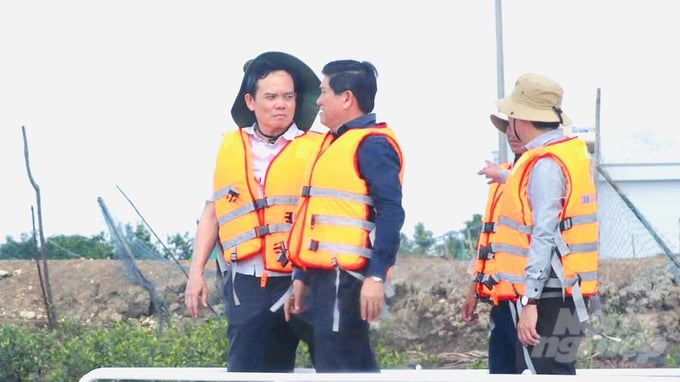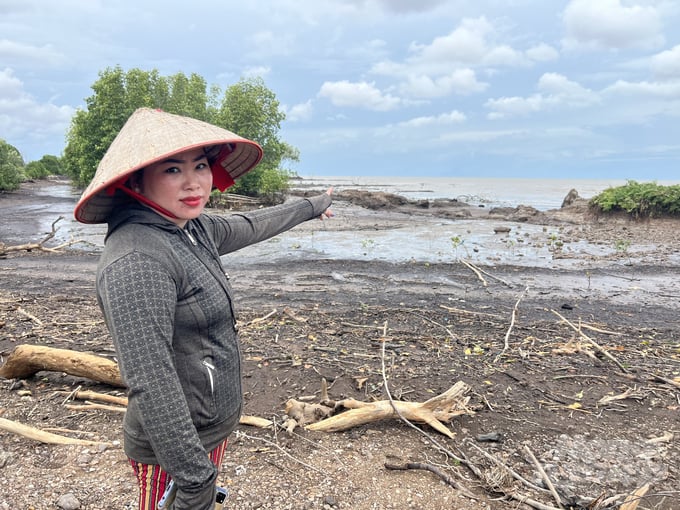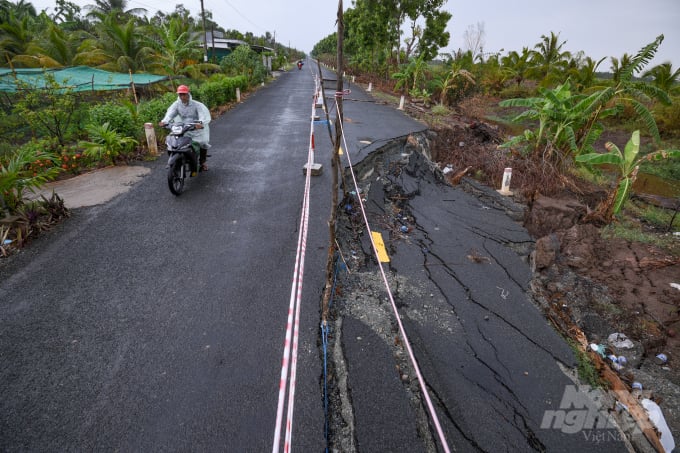May 18, 2025 | 17:16 GMT +7
May 18, 2025 | 17:16 GMT +7
Hotline: 0913.378.918
May 18, 2025 | 17:16 GMT +7
Hotline: 0913.378.918
The Government Office recently issued a statement detailing the directives of Deputy Prime Minister Tran Luu Quang following his inspection of dykes and erosion in Bac Lieu and Ca Mau provinces.

Deputy Prime Minister Tran Luu Quang conducting an inspection of coastal erosion in Ca Mau Province. Photo: Trong Linh.
Following his visit to assess the state of coastal erosion at Ganh Hao estuary in Bac Lieu and Ca Mau provinces and receiving reports from the local governments as well as the Ministries of Agriculture and Rural Development, Finance, and Planning and Investment, Deputy Prime Minister Tran Luu Quang emphasized the Mekong Delta's critical role in Vietnam's socio-economic development, national security, and its significant contribution to enhancing the country's standing regionally and globally through agricultural exports, with a focus on rice.
Deputy Prime Minister Tran Luu Quang emphasized that the Mekong Delta is the most vulnerable region in the country to the impacts of climate change and rising sea levels. According to the Ministry of Agriculture and Rural Development and the provincial governments of Bac Lieu and Ca Mau, erosion along riverbanks, coastlines, and land subsidence in the Mekong Delta, especially in the two aforementioned provinces, is rapidly progressing, marked by unusual developments.
Erosion is occurring both during the rainy season and the dry season, affecting not only rivers but also canals and protective structures. Notably, erosion in select regions poses significant risks to the safety of sea dykes, the local community, essential infrastructure for transportation and irrigation, and severely affects local business and daily life.
On behalf of the Government Standing Committee and the Prime Minister, Deputy Prime Minister Tran Luu Quang expressed sympathy for the significant challenges faced by provinces in the Mekong Delta, particularly concerning the impacts of climate change, rising sea levels, drought, saltwater intrusion, riverbank and coastal erosion, and land subsidence.

Coastal erosion in Tam Giang Tay Commune, Ngoc Hien District, Ca Mau Province. Photo: Trong Linh.
Regarding upcoming tasks and solutions, Deputy Prime Minister Tran Luu Quang requested local governments in the Mekong Delta region, particularly Bac Lieu and Ca Mau provinces, as well as relevant ministries and agencies, to drastically implement the tasks and solutions for erosion and subsidence prevention as outlined under the Government Office Notification No. 349/TB-VPCP dated August 24, 2023. Several key focus points in include:
Forecasting and identifying areas at risk of erosion and subsidence to provide timely warnings to local residents, thereby avoiding unforeseen damage to lives due to riverbank and coastal erosion or land subsidence.
Enhancing communication efforts to encourage residents in areas showing signs of erosion to proactively evacuate and minimize property damage. Stakeholders must develop plans to support displaced residents with accommodation and livelihood options in compliance with regulations.
Promote the planning and construction of erosion prevention infrastructure in a comprehensive, integrated, and multi-purpose direction, with an emphasis on meeting sustainable development requirements. Avoid constructing projects that can negatively impact neighboring regions, particularly along the same river, or create conflicts of interest and waste resources.
Due to the significant funding needs for constructing erosion prevention infrastructure, local governments must prioritize investments based on available resources. They must balance local budget allocations with central government support and mobilize other legal funding sources (including non-budgetary resources) to ensure systematic and coordinated implementation.

Ca Mau Province has exhibited increasingly complex erosion developments within the last few years. Photo: Trong Linh.
The Ministry of Agriculture and Rural Development is accelerating the completion of a comprehensive plan for the Mekong Delta region, which includes tasks for erosion and subsidence prevention, drought management, and saltwater intrusion control. This plan is currently under development in compliance with the directives assigned by the Prime Minister.
Regarding the urgent investment in addressing erosion-prone areas that directly affect local residents and essential infrastructure, the Chairpersons of the Bac Lieu and Ca Mau Provincial People's Committees have been requested to conduct thorough reviews and prioritize areas for immediate action. Moreover, they should allocate local budget reserves and other legal funding sources to address critical and urgent areas, thereby protecting the safety of local residents and infrastructure. In the event of insufficient local budgets, stakeholders must carefully prepare and submit documentation and reports to relevant authorities in accordance with state budget laws, public investment regulations, disaster prevention laws, and other applicable legal provisions.
The Ministry of Planning and Investment, in accordance with its assigned functions and the directives outlined in Government Office Document No. 5218/VPCP-KTTH dated July 23, 2024, will lead the collaboration efforts with the Ministry of Agriculture and Rural Development, the Ministry of Finance, and other relevant agencies. This coordination will involve compiling, reviewing, and assessing projects proposed by local governments to provide funding support as needed. The Ministry will recommend solutions for critically urgent projects in accordance with state budget laws, public investment regulations, disaster prevention laws, and other applicable legal provisions. Subsequently, the Ministry will submit these proposals to competent authorities for approval.
On August 11, Deputy Prime Minister Tran Luu Quang led a delegation to conduct inspections and surveys of coastal erosion at Vinh Trach Dong Commune (Bac Lieu City), Ganh Hao Riverbank (Dong Hai District, Bac Lieu Province), and coastal erosion at the Ganh Hao estuary in Bac Lieu and Ca Mau provinces. The delegation also held a meeting with the local governments to discuss the state of erosion and ongoing efforts for riverbank and coastal erosion prevention.
Translated by Nguyen Hai Long

(VAN) 14 out of 35 domesticated elephants in Dak Lak province have had their living conditions improved, with 11 of them currently participating in the non-riding elephant tourism model.

(VAN) Muong Nhe Nature Reserve hopes that being upgraded to a national park will lay the foundation for forest protection efforts to be carried out in a systematic, modern, and sustainable manner.
/2025/05/16/3923-2-171845_52.jpg)
(VAN) Lower costs, higher yields, and improved soil quality are outstanding benefits that soybeans bring when integrated into the crop rotation system.

(VAN) The 'For a Green National Environment' programme aims to promote a green lifestyle, support businesses in implementing ESG practices, and turn Net Zero commitments into concrete actions.

(VAN) Cold-barn systems efficiently manage environmental and temperature conditions, which aids in the prevention of respiratory diseases in pigs and protects them from the vectors that transmit African swine fevers.

(VAN) To tackle challenges, the project 'Addressing key technical bottlenecks in the grouper supply chain in Vietnam' has been underway since 2024.

(VAN) The project 'Disease-Resilient and Sustainable Cassava Production Systems in the Mekong Region', funded by the Australian Center for International Agricultural Research (ACIAR), is being implemented from 2024 to 2028.